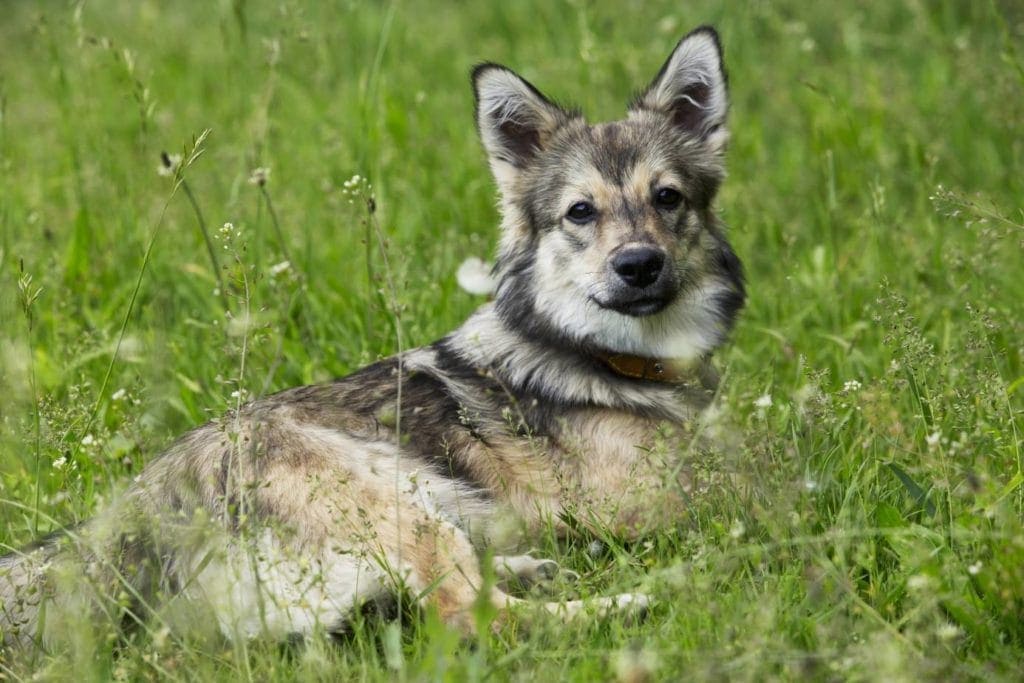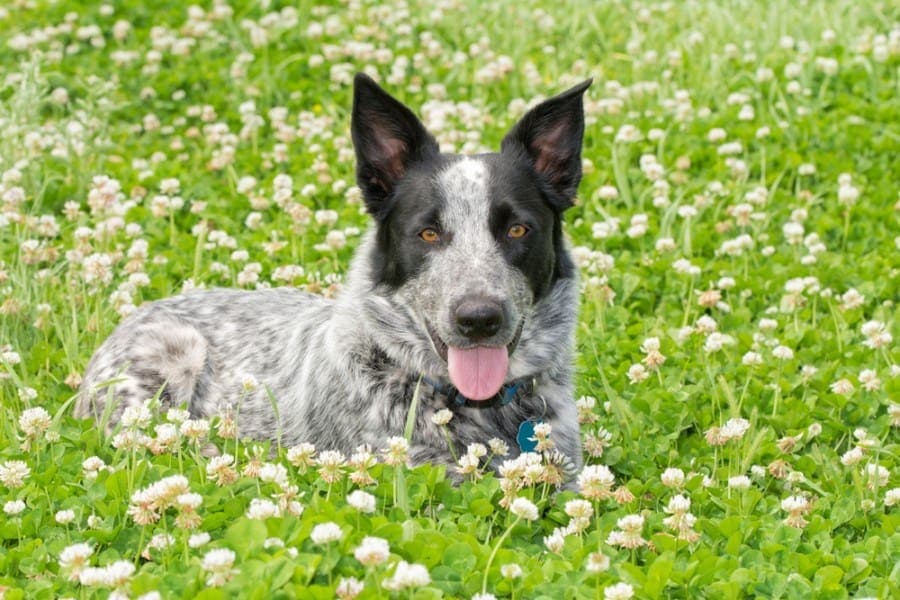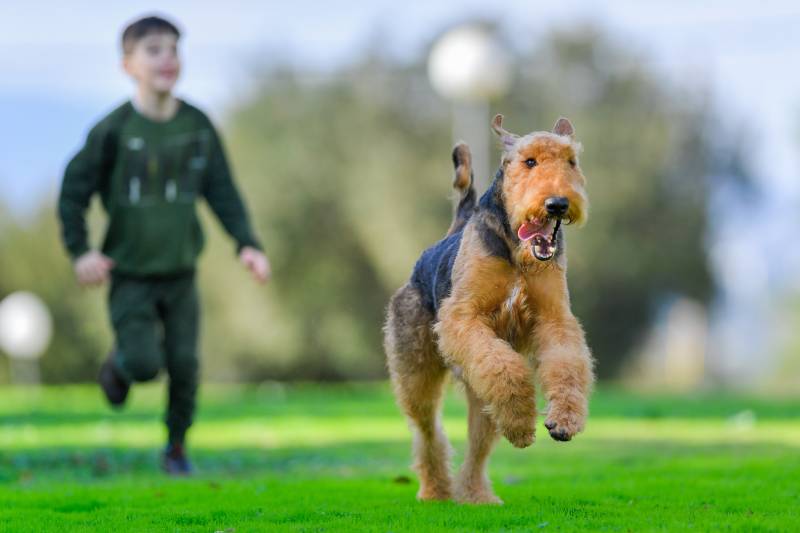Westie vs Yorkie: Differences Explained (With Pictures)
By Cheryl Regan
Updated on
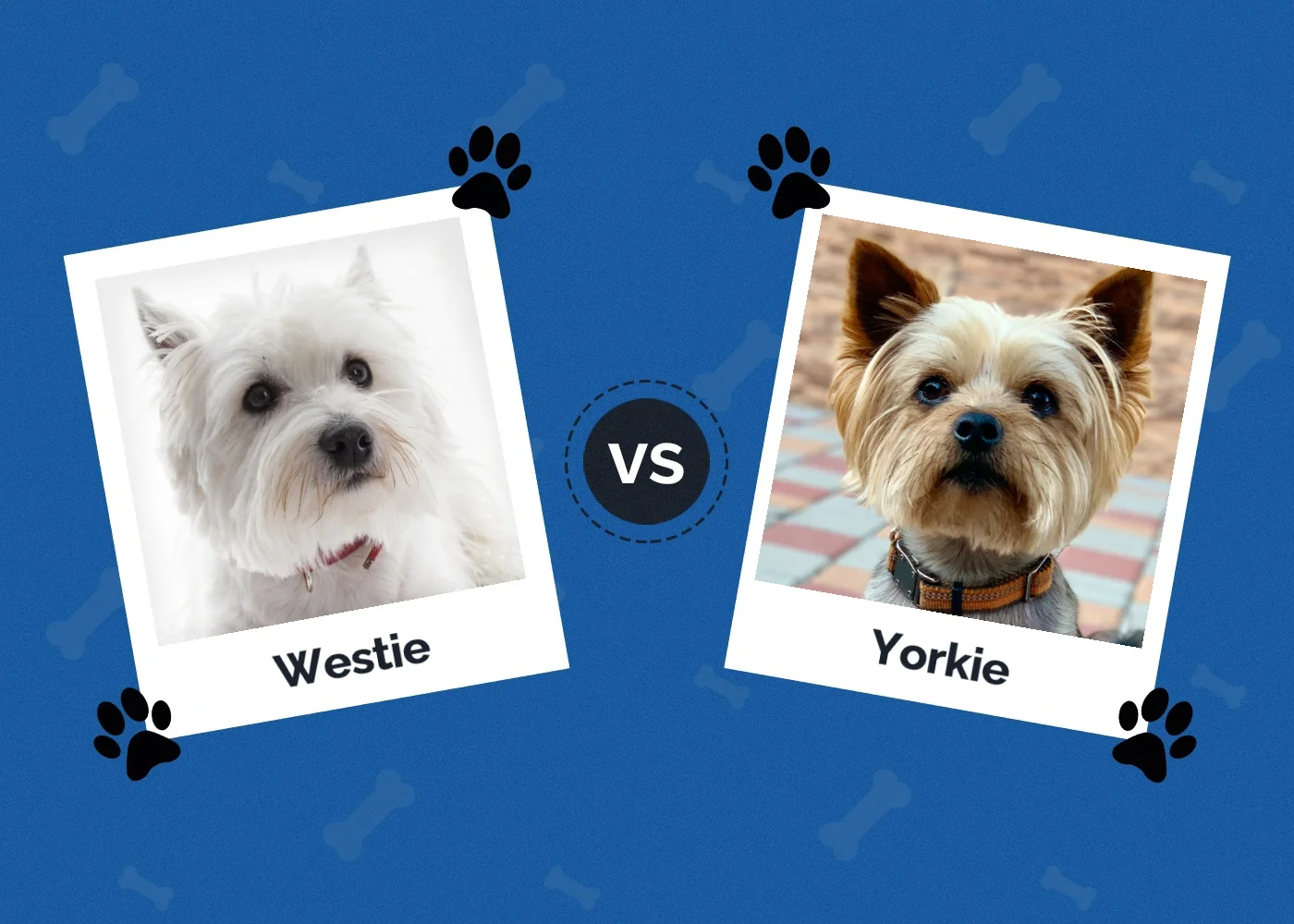
Click to Skip Ahead
Westies and Yorkies are both adorable pint-sized fluffy pups with tremendous amounts of energy, and although neither is inherently better than the other, they do have slightly different needs. When it comes to choosing between a West Highland White Terrier and a Yorkshire Terrier, understanding their subtle differences can help decide which dog would be a better fit for your household.
Both Westies and Yorkies are Terriers that originate from a blend of Scottish breeds. Westies were specifically bred to hunt foxes, otters, and badgers, while Yorkies were initially bred as ratters. Even today, both dogs display a strong prey drive.
Keep reading to learn more about the differences between Westies and Yorkies, including their size, coats, colors, and temperament!
Visual Differences
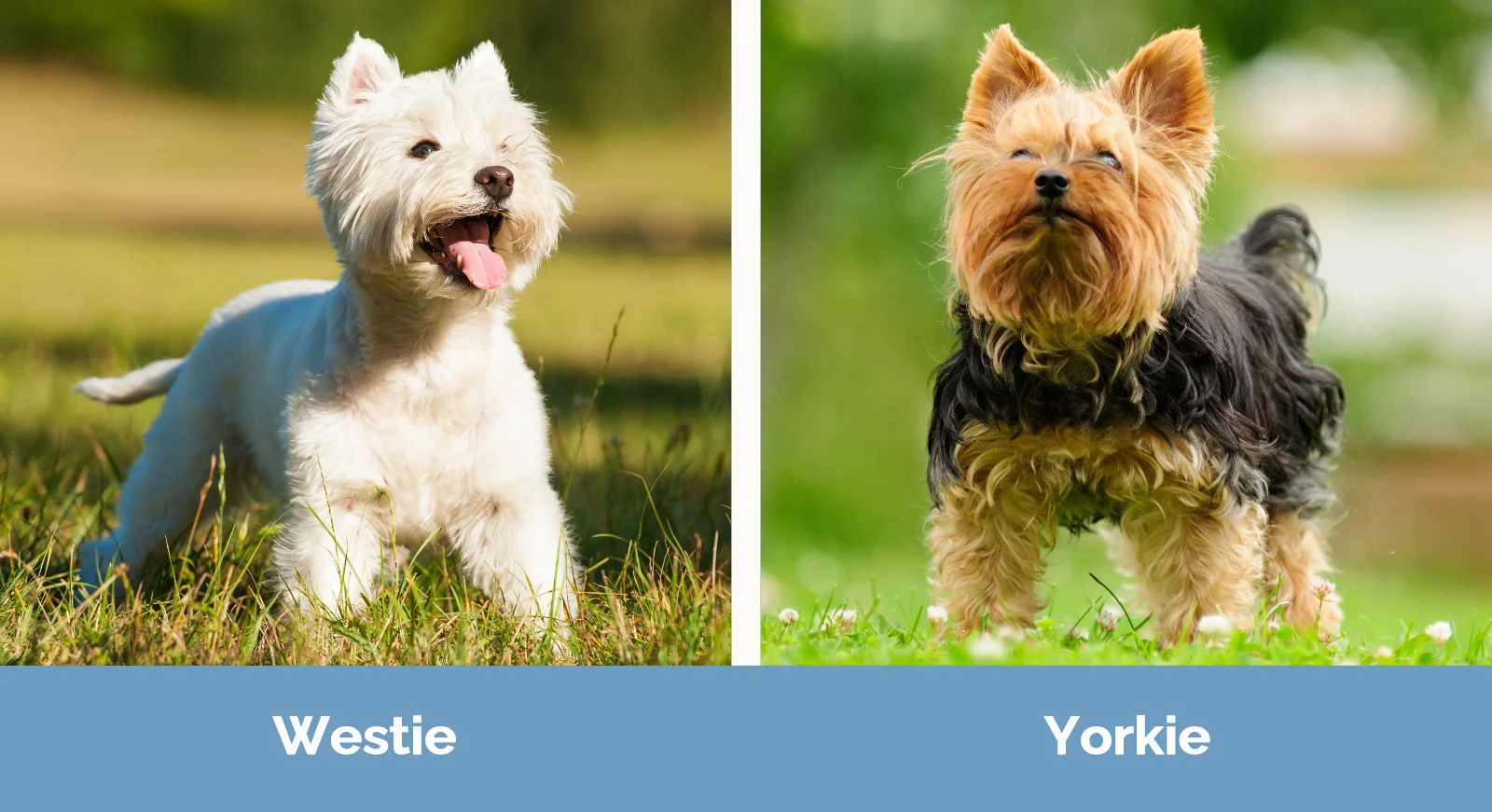
At a Glance
- Average height (adult): 10–15 inches
- Average weight (adult): 15–20 pounds
- Lifespan: 12–14 years
- Exercise: 60–90 minutes a day
- Grooming needs: Moderate
- Family-friendly: Yes
- Other pet-friendly: Often
- Trainability: Independent but intelligent, requires consistency
- Average height (adult): 7–8 inches
- Average weight (adult): 4–7 pounds
- Lifespan: 11–15 years
- Exercise: 30–40 minutes a day
- Grooming needs: High
- Family-friendly: Yes
- Other pet-friendly: Often
- Trainability: Intelligent, eager to please
West Highland White Terrier Overview
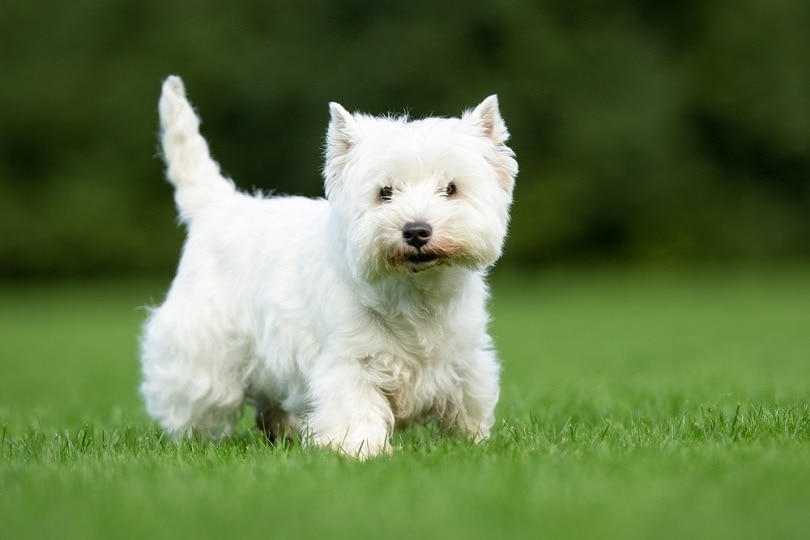
The West Highland White Terrier has been around since the mid-19th century. According to legend, after a reddish-brown terrier was mistaken for a fox and shot, Edward Donald Malcom, 16th Laird of Poltalloch, set about to develop a whiter terrier.
Known back then as the Poltalloch Terrier, these early Westies had sandy-colored coats, and the familiar prick ears they still have today.
Today, Westies are known for their pure white coats, which consist of a soft furry undercoat and a rougher, straight outer coat.
Personality / Character
An energetic breed, West Highland White Terriers love to run around and chase other animals. They’re great with older children, but they can get overexcited, so they should always be supervised around smaller children.
Despite their fierce self-reliance, Westies are deeply loyal to their humans. These friendly little dogs have a naturally happy disposition. If you’re looking for a quiet dog, a Westie is not the best option—they tend to be vocal! If you’re looking for a small, sociable fluff ball that’s bursting with energy, however, Westies may be ideal for you!
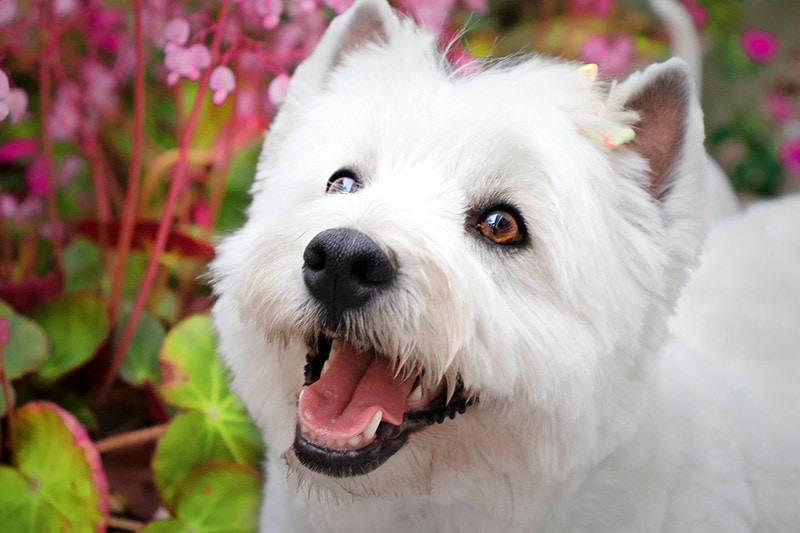
Training
West Highland White Terriers are known for their fierce independence, which can make training a challenge. Luckily, these dogs are also both loyal and intelligent, and therefore with enough patience, consistent training, and positive reinforcement, Westies are absolutely trainable.
The Westies’ keen intelligence and playfulness make them ideal for agility training. Agility training is a great way for your Westie to burn some of their energy while also creating a perfect bonding opportunity!
Health & Care
Westies are generally healthy dogs, with a good average lifespan of 12–14 years. Like all breeds, however, there are some minor and major health problems that they can be prone to, including:
- Keratoconjunctivitis Sicca
- Copper Toxicosis
- Patellar Luxation
- Cataract
- Legg-Perthes Disease
- Craniomandibular Osteopathy
- Globoid Cell Leukodystrophy
- Skin Disease
Westies also occasionally suffer deafness. For the best chance of keeping a healthy Westie, be sure to only buy your dog from a reputable breeder who carries out tests on each of the parents and take your dog for regular check-ups with a veterinarian.

Grooming
Westies need a regular grooming routine to keep them healthy and happy. They require a moderate level of grooming—you’ll need to brush their double coats a few times per week and clip their hair once every 3 months. Regular stripping by a professional groomer will help to strengthen the quality of a Westie’s coat.
Suitable For:
West Highland White Terriers are loving and good-natured dogs that can make great family pets, though they tend to do better with older children. They can adapt to living in either an apartment or a house, provided they get an adequate amount of daily exercise.
Yorkshire Terrier Overview
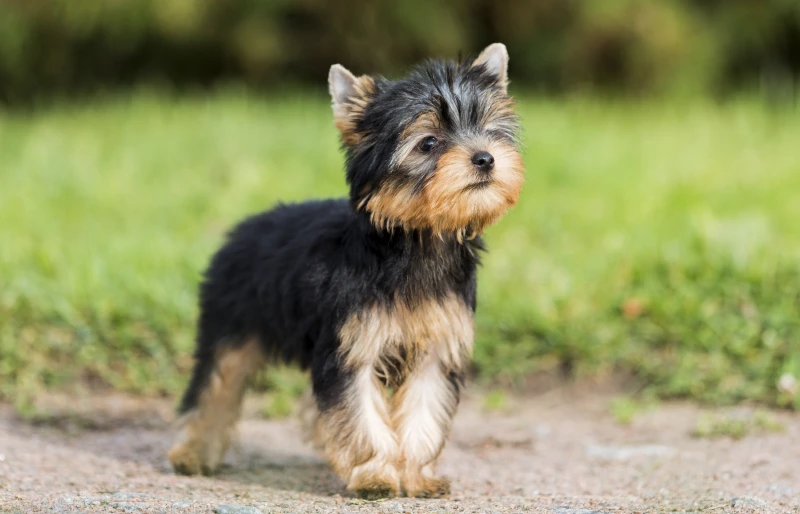
If you’re on the hunt for a toy-sized bundle of character and energy, the Yorkshire Terrier is a great option. These adorable terriers are tenacious balls of excitement, wrapped in beautiful coats of steel blue and gold tan.
Originating from Yorkshire, England, Yorkies were bred in the mid-19th century by miners who wanted a ratting terrier, a trait that shines through to this day. Despite their adorable little size, Yorkies are feisty! They have a strong prey drive, and they’ll happily chase any moving objects.
Yorkshire Terriers are vocal little dogs, which makes them excellent watch dogs, if that’s what you’re looking for. Although they are prone to developing barking issues, these can usually be resolved with exercise and training.
Personality / Character
Yorkshire Terriers are intelligent and self-assured. These dogs aren’t afraid to be a little bossy sometimes. They are energetic and fun-loving, and they certainly won’t refuse a cuddle. Their compact size makes them perfect for small homes as well as large ones, and they only need a small amount of exercise—between 30 and 40 minutes—per day.
If you’re looking for a tiny companion with a large personality, Yorkshire Terriers are a great option. These dogs also fit well into families, though it’s important to keep them supervised around smaller children as their tiny size can make them vulnerable.
Yorkshire Terriers are not quiet dogs. They take their role as a watchdog seriously, which can lead to excessive barking. With training and positive reinforcement, they can learn to control this.
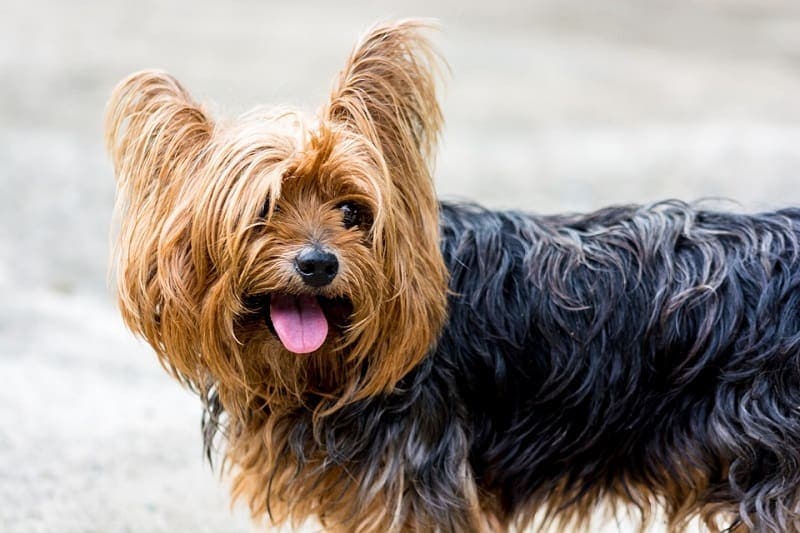
Exercise
Yorkshire Terriers are incredibly energetic and playful dogs. They may be little, but they still need between 30–40 minutes of exercise per day. They’ll love running, chasing, and playing games such as fetch and hide and seek.
Training
Yorkshire Terriers are not the easiest breed to train! That’s because, unlike some breeds, they are not particularly motivated by food. That said, these dogs are very intelligent, and they also tend to be eager to please. With enough patience, plenty of verbal praise and positive reinforcement, and consistency, it is possible to train a Yorkie.
As with Westies, Yorkshire Terriers are great candidates for agility training.
Health & Care
Most Yorkshire Terriers are generally healthy, but some medical issues may affect them. Their compact size makes them prone to hypoglycemia. To prevent this, it is recommended that you feed them small amounts frequently throughout the day.
- Dental Disease
- Patellar Luxation
- Tracheal Collapse
- Liver Shunt
Grooming
Yorkshire Terriers require a high level of maintenance when it comes to grooming, especially if you intend to keep their coat long. A Yorkie’s coat needs daily brushing to keep it smooth, silky, and shiny. If you keep their coat clipped short, then you can brush them a few times a week to prevent knots.
A Yorkie should have their hair clipped every 4–6 weeks.
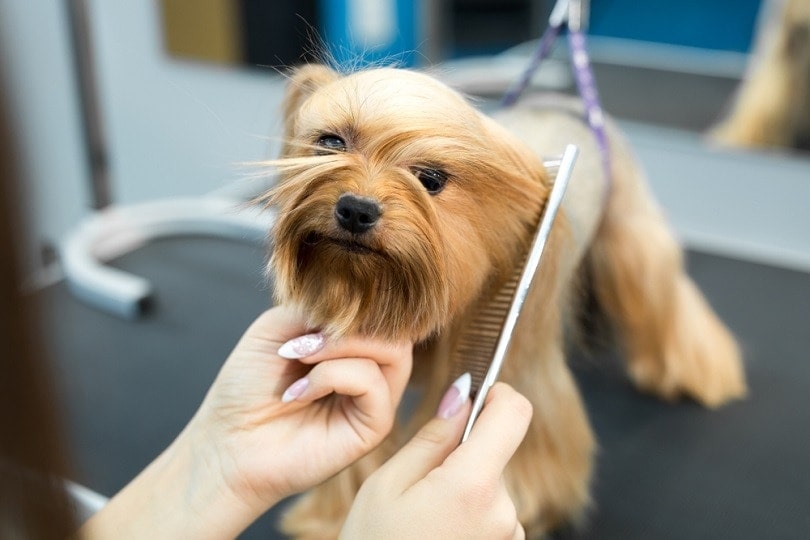
Suitable For:
Yorkshire Terriers are ideal for anyone who wants a small breed with lots of energy. They need daily exercise, but their compact size means they’ll adapt well to both small and large homes. Yorkies can make great family pets, but they should be supervised when playing with small children to avoid the tiny dog from accidentally getting hurt.
Although Yorkshire Terriers can be trained, they need time, patience, and consistent effort. If you have time to dedicate to these wonderful dogs, they will become a happy, loyal member of the family.
Which Breed Is Right for You?
Westies and Yorkies share many similarities, so it’s not surprising that they can be difficult to choose between. Neither breed is better than the other, but they do have slight differences that can make them more suitable for different people.
For example, Westies are slightly larger, and they need more exercise than Yorkies. If you want to take your dog out for more than an hour per day, a Westie is a better option. If you’re looking for the smaller dog out of the two, then Yorkshire Terriers are almost half the size and weight of Westies.
Whichever terrier you opt for, both these dogs can become affectionate, loving, and loyal members of the family!
Featured Image Credit: Left – chriskeller, Pixabay | Right – Daria Turchak, Unsplash



